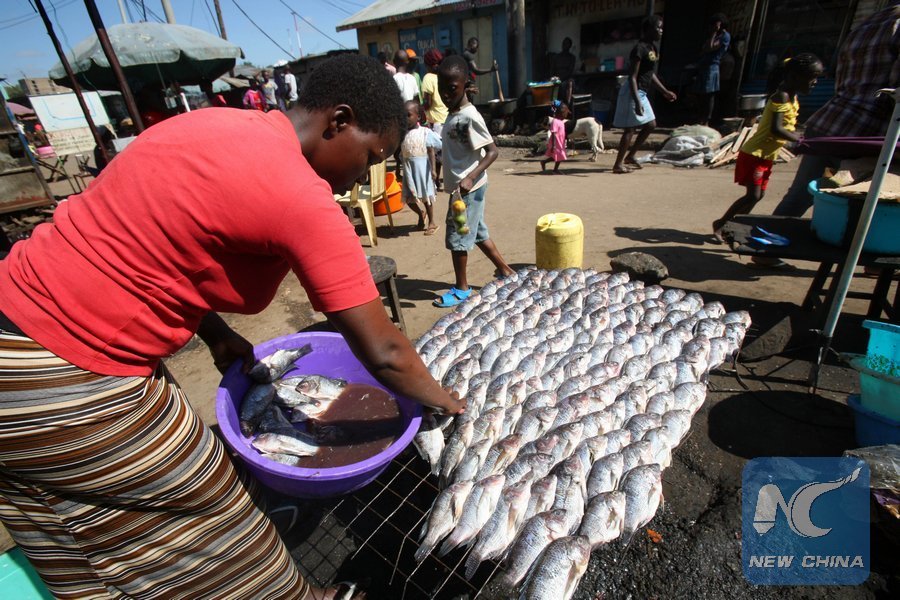
A woman displays tilapias for sale in Mathare Slums in Nairobi, capital of Kenya, Dec. 29, 2015. (Xinhua/John Okoyo)
by Joy Nabukewa
MOMBASA, Kenya, Oct. 18 (Xinhua) -- Kenyan maritime scientists said Tuesday the introduction of tilapia, a fresh water species, to marine waters along the Kenyan coast will help local fish farmers increase output and tap export markets.
Two experts from Kenya Marine Research Institute, James Mwaluma and David Mirera, told Xinhua during an interview in the coastal city of Mombasa that the introduction of tilapia into the coastal waters will relieve farmers of shortage of fish for seed and food.
He said fish farming in marine waters referred to as mariculture has been going on for quite a while in the Kenyan coast but a lack of profits and poor sustainability prompted the search for fresh ideas that would add value to fish farming.
"The practice has not been as lucrative and sustainable as was envisaged which led us to borrow best practices from China to reduce pressure on marine resources for communities living along the Indian Ocean," Mirera said.
The expert said they have followed closely the footsteps of China and other Asian countries that have diversified fish farming for local and export markets and reduce pressure on marine resources.
"Borrowing a leaf from China, a country that is miles away, we embarked on this research to introduce tilapia and after a rigorous exercise that lasted about one year, we were able to come up with these findings," said Mirera.
The specialist said the lessons learned from the Chinese, who have an advanced fish farming sector, came to fruition after one year of rigorous implementation.
Some communities have already started harvesting tilapia, he said.
Mirera said the findings of the research, which had financial and technical backing from the Australian Department of Foreign Affairs and Trade, convinced them to introduce a pilot mariculture project whose results were quite fulfilling.
According to the findings, tilapia farmed in marine environment takes much less time to mature and has more value than the normal milk fish which has been farmed at the Kenyan coast.
Mirera said they have been able to develop a pure breed of marine tilapia which reproduces faster and can be ready for harvesting within four to five months.
"This means a farmer can harvest two to three times a year, earning more money because of the ready and valuable market than the other species," he said.
The Kenya Marine and Fisheries Research Institute has for many years been trying to help farmers get a steady supply of seed.
The experts said the biggest challenge in fish farming along the Kenyan coast has been availability of seed and that plans are underway to set up a hatchery in Kenya's south coast to address this problem as well as that of value addition.
"The new findings with marine tilapia means that farmers are able to get fingerlings throughout the year, making fish farming a full-time engagement for the fish farmers in the area," said Mwaluma.
Tilapia seed, he said, is easily available and does not depend on seasons like other varieties where the fingerlings can only be obtained in the month of April.
The pilot-phase findings further revealed that a fish pond measuring 1,200 square meters can accommodate over 3,000 fish with a worth of about 30,000 U.S. dollars per harvest.
The researchers said the next step will be a campaign for more people to take up fish farming.

